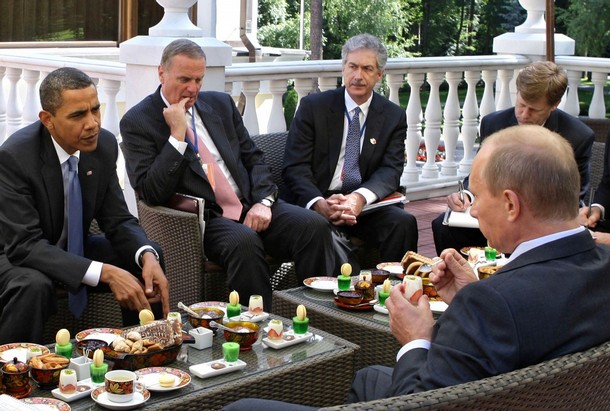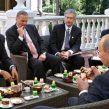
Obama Praised in Moscow for Moderation
Publication: Eurasia Daily Monitor Volume: 6 Issue: 131
By:

President Barack Obama’s administration wanted to make the Moscow summit a success, and their Russian counterparts, though more skeptical, decided to follow this approach. Positive speeches were made and a cluster of agreements signed. Contentious issues were mentioned, but not emphasized. The atmosphere in U.S.-Russian relations has improved, which seems to have been the main mutual goal.
Obama and President Dmitry Medvedev signed a framework agreement on strategic nuclear arms that aims within ten years to cut the number of deployed warheads on both sides to 1,500-1,675 and strategic delivery systems to 500-1,100. Both sides expressed optimism that a comprehensive treaty will be ready for approval by the end of the year (www.kremlin.ru, July 6). However, there are still many disagreements remaining on the final number of delivery systems, ballistic missile defense (BMD) and on U.S. plans to deploy long-range non-nuclear weapons. Disagreements on BMD have, in effect, been papered over to produce a more positive summit, but later they might impede plans for the speedy conclusion of a treaty.
Moscow has particularly opposed U.S. plans to deploy components of the BMD in Poland and the Czech Republic. These proposed BMD sites were initially planned to become operational after 2013, but could be further postponed by the Obama administration. While avoiding the topic of abandoning BMD plans for Europe, as Moscow wanted, Obama, according to Prime Minister Vladimir Putin’s foreign policy aide Yuri Ushakov, promised to take into account Russian concerns (Interfax, July 7).
Obama had a "Russian style" working brunch with Putin with smoked beluga and black caviar. At present, the commercial production, sale and consumption of beluga or black caviar is illegal in Russia to protect endangered species. It was speculated that Putin served Obama Iranian-made caviar, which is legal (Interfax, July 8). Of course, in Russia, laws do not apply to the top nomenklatura, so the delicacy Obama consumed was most likely Russian-made and contraband. It is not clear what is politically more damaging for a U.S. president: to publicly eat Iranian caviar or Russian contraband. Putin indeed has a peculiar sense of humor.
Before the brunch Obama announced he had "excellent discussions" with Medvedev and praised Putin for doing "extraordinary work on behalf of the Russian people" as the former president, and now prime minister (The White House, Office of the Press Secretary, July 7). Under Putin’s rule since 2000, elections have been regularly rigged, and political and press freedoms crushed. Last August, Putin and Medvedev ordered Russian troops to invade neighboring Georgia and occupy its territory, but for Obama these issues seem to be secondary.
The government-controlled media has observed with approval Obama’s "hands off" approach to human rights issues in Russia. "The atmosphere of friendship and ‘reset’ was all over the last two days," wrote Interfax as Obama left Moscow. Obama praised the Russian authorities "for moving in the right direction in developing civil society," and announced that he did not intend to teach Russia anything while making no public mention of the case of the murdered Novaya Gazeta reporter Anna Politkovskaya or any other prominent instances of political repression. This was in "marked contrast to the attitude of the previous U.S. administration" (Interfax, July 8). Obama’s "hands off" approach reportedly disappointed human rights activists (Vedomosti, July 8). However according to Obama’s assistant and senior director on Russia, Michael McFaul, Obama did not cite specific violations of democratic principles by the Russian government by design, since the lecturing tone adopted by George W. Bush failed to further the cause of democracy (Wall Street Journal, July 8).
The U.S. Chairman of the Joint Chiefs of Staff Admiral Mike Mullen and the top Russian military commander, the Chief of the General Staff and First Deputy Defense Minister Army-General Nikolai Makarov signed an agreement to resume U.S.-Russian military cooperation, watched by Obama and Medvedev. According to the White House press service, quoted by Interfax on July 6, the agreement will allow some 20 joint U.S.-Russian military exercises in 2009. Nonetheless, Makarov said there will be no joint military exercises in 2009 – only discussions to possibly stage them in 2010 (ITAR-TASS, July 6). Military cooperation was broken off to punish Russia after the August war with Georgia. It seems that Washington is now more eager to forgive Moscow for the invasion than Moscow aspires to be forgiven.
Mullen and Makarov also signed an agreement to allow U.S. air transit of troops and supplies through Russian airspace. McFaul told reporters that this is a very important and concrete agreement that will permit some 4,500 flights annually, and that Russia has waived collecting an estimated $133 million in navigation fees (www.foxnews.com, July 6). At present U.S. flights successfully reach Afghanistan while bypassing Russia and the transit agreement seems to be the only definitive result of the summit.
The act of acute political appeasement of Putin and Medvedev performed by the Obama team in Moscow has produced something, but what will be the final price? Obama discussed Georgia with Putin and agreed to disagree (Interfax, July 7). President Mikheil Saakashvili interpreted Obama’s statement, reiterating Georgia’s independence and territorial integrity, as a demonstration of "unconditional support" (Civil Georgia, July 6), but is that indeed true?
The ramifications of the Moscow summit depend on how Putin understood Obama and his team. Russia is ready to give the U.S. a free hand in Afghanistan, but in exchange it wants freedom to deal with Georgia. If Obama is seen as too weak and compromising, Putin may decide to act against Georgia unilaterally, believing Obama has already been paid off.




